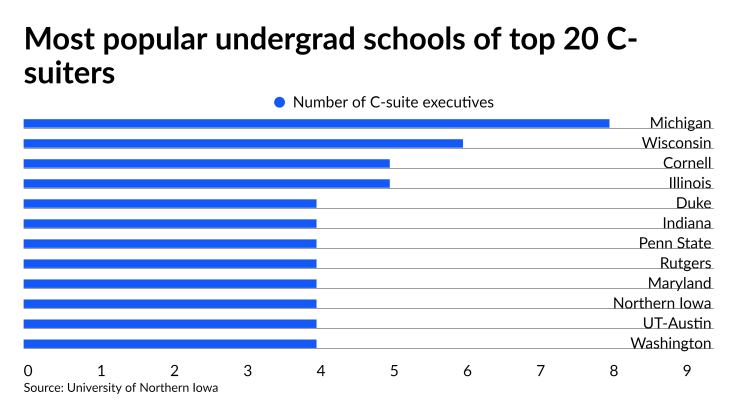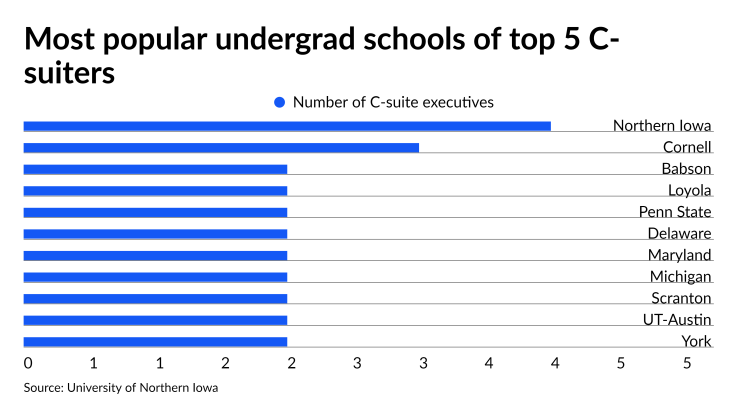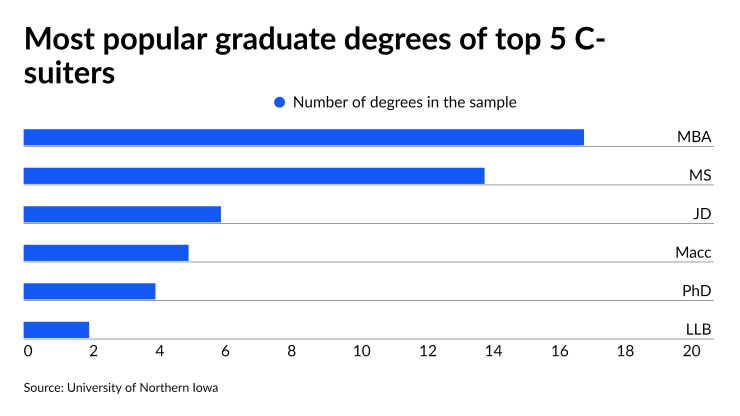Aspiring accounting graduates targeting C-suite positions in public accounting can reach their goal by starting as a staff accountant, then advancing through promotions and education.
A high-quality education is essential for securing C-suite roles, which demand strategic thinking, decision-making and responsibilities such as budgeting, forecasting, and financial analysis. An excellent education further equips students with the skills and knowledge required for CEO, CFO and executive positions. The education chosen by students can affect their future opportunities, and a high-quality education helps students cultivate diverse abilities, including problem-solving, critical thinking, communication and teamwork.
The rising cost of higher education raises the question of where to get a degree. With college selectivity in question at the highest level of the court system, and with undergraduate and graduate degrees costing hundreds of thousands of dollars at some schools, questions like "Do I need to attend a top national university?" or "Do I need a graduate degree at all" arise.
To help answer these questions, this study examines the educational backgrounds of current C-suite executives in top public accounting firms. This approach provides valuable insight into where aspiring individuals can pursue their degrees, as the universities and programs attended by top executives have likely equipped them with the skills, knowledge and connections necessary for success in their careers. Hence, obtaining a degree from a similar institution increases the chances of success for those pursuing a similar career path. The findings illustrate that students have a wide range of options, and university selectivity and rankings have little correlation.
Behind the study
For the study, we consulted Masterclass.com, which lists 18 C-suite positions in public accounting, including chief client officer, chief communications officer, chief compliance officer, chief data officer, chief diversity officer, chief executive officer, chief financial officer, chief human resource officer, chief information officer, chief legal officer, chief marketing officer, chief operating officer, chief risk officer, chief security officer, chief strategy officer, chief sustainability officer, chief talent officer and chief technology officer.
Then we used Google, which ranks the top 20 public accounting firms by size: (Top 5) Deloitte, PwC, EY, KPMG, RSM; (6-10) BDO, Grant Thornton, Forvis, CliftonLarsonAllen, Baker Tilly; (11-15) CBIZ MHM, Crowe, Moss Adams, Plante Moran, CohnReznick; (16-20) Marcum, EisnerAmper, Eide Bailly, Wipfli and Andersen. We conducted an analysis of the academic backgrounds of 303 C-suite executives, with a population of 86 from the Top 5 firms, 80 from 6-10, 69 from 11-15, and 68 from 16-20. Smaller firms are less likely to fill all 18 C-suite positions from Masterclass.com, or in some cases, the same person may fulfill multiple C-suite roles.
Finding for the top 20 accounting firms
This study compares the academic backgrounds of top executives at the 20 top public accounting firms listed by Google, which are divided into four groups: the Top 5, 6-10, 11-15 and 16-20. Overall, only 7% of the executives in the top 20 accounting firms hold a bachelor's degree from a top national university. Executives from the top 5 firms are more likely to hold a bachelor's degree from a top 20 national university (9%), whereas this is less common among executives from smaller firms, with only 6% of key executives holding a highly rated bachelor's degree in the rest of the top 20.
A total of 201 universities have at least one graduate sitting in a C-suite position at one of the 20 largest public accounting firms, and 52 universities have at least two. There are no online or for-profit universities represented in the results.
Twelve universities had at least four or more sitting C-suite executives, with the University of Michigan having the most (8), followed closely by the University of Wisconsin (7), University of Illinois and Cornell University (5), and University of Washington, UT Austin, Northern Iowa, Maryland, Rutgers, Penn State, University of Indiana, and Duke (4). Only Cornell and Duke ranked in the top 20 among national universities and have undergraduate degree holders sitting in C-suite positions at the top 20 public accounting firms. The most popular schools for C-suiters tend to be large public universities ranked outside the top 20.

Graduate degrees are highly prevalent for C-suite executives, with 49% of executives in the top 5 firms having one or more graduate degrees, with the figures for the 6-10, 11-15 and 16-20 firms following closely at 40%, 41% and 39%, respectively. Degrees from top 20 national universities are more prevalent among executives in top 5 public accounting firms (17%) compared to those in smaller firms, which is 8% for 6-10, 5% for 11-15, and 5% for 16-20.
Overall, the findings suggest that an undergraduate degree from a top 20 national university is not necessary to reach the C-suite at a top 20 public accounting firm, potentially assuaging fears that students need to get into highly rated universities or their careers will be impeded. With over 200 universities represented in our pool of 303 C-suite executives, there are many excellent options for students wishing to pursue a high-quality accounting education. The findings also demonstrate that a graduate degree is useful, but the bulk of the current accounting executives did not earn their graduate degree at a top 20 national university. However, there is a difference in the top 5 accounting firms, so a deeper dive into those firms is warranted.
Findings for top 5 firms
Deloitte, PwC, EY, KPMG and RSM hold the top 5 positions in revenue generation across all service lines, audit, tax and consulting. They collectively employ well over 300,000 employees and have a global impact. Among the top 5 firms, C-suite executives hold undergraduate degrees from a variety of schools. Schools with at least two current executives include Babson College, Cornell (3), the University of Delaware, Loyola University, University of Maryland, Michigan, Penn State University, University of Scranton, University of Texas-Austin, University of Northern Iowa (4) and York University.
The significance of attending a top-ranked national university for undergrad education is also examined, and results show that out of the top 20 national universities listed by U.S. News & World Report (2022), Cornell University has three C-suite executives, while one executive each came from Brown, Columbia, Duke, Harvard and Wharton. Despite the benefits of attending a top national university, the data demonstrates that successful executives also emerge from many other schools.

Of the 86 key executives in the top 5 public accounting firms, 49% hold one or more graduate degrees. The most popular graduate school is Harvard, with five graduates in C-suite positions, followed by Columbia, Wharton and UT-Austin, each with three graduates in such roles. Other institutions with multiple graduates among the top C-suite executives include George Mason, Georgia, Long Island University and Manchester, each with two graduates.
This result raises the question of whether attending a top 20 ranked graduate school is necessary to reach the C-suite in top public accounting firms. An examination of the number of top C-suite executives who obtained their graduate degrees from a top 20 national graduate school as ranked by U.S. News & World Report (2022) reveals that 19% of the 86 executives studied at a top-ranked graduate school, while 81% did not. The data suggests that a graduate degree from a top 20 ranked graduate school is helpful, and graduate education for many other universities is highly valued.
Finally, the type of graduate degree held by the top five executives provides valuable insights. Out of 86 key executives, the most common graduate degree is an MBA, held by 17 individuals, followed by MS (14), JD (6), MAcc (5), PhD (4), and LLB (2). The high prevalence of MBAs over MAccs may be due to the MBA's comprehensive focus on business knowledge, leadership skills and strategic thinking. MBA programs equip young accountants with a thorough understanding of various business aspects and leadership skills, making them valuable for those aspiring to reach executive positions.
It is important to also consider that the limited number of MAcc degrees earned by these executives may not reflect their utility, but instead suggest that the degree has only recently become more popular in the past 20 years with the implementation of the 150-hour requirement by the AICPA, as the group of 86 top executives in this sample are a mature group.

Conclusions
In conclusion, the data illustrates that potential accounting students can reach great heights in the profession with a degree from a reputable university. A degree from a top 20 ranked institution is unnecessary. However, it's noteworthy that even though only a minor fraction of key executives holds a bachelor's degree from renowned national universities, a higher percentage of executives from the top 5 firms hold such esteemed credentials.
Half of the top executives have a graduate degree, with an MBA being the most popular; these degrees are not necessarily from nationally ranked programs. But again, executives from the top 5 firms are more likely to have earned a graduate degree from a top-ranked national institution than their peers in smaller firms.
This finding suggests that, overall, degrees from top-ranked universities may offer a slight edge, but degrees from lower-ranked or smaller national and regional universities have proven sufficient for success in the C-suite. Therefore, these findings should be considered when deciding on where to pursue academic degrees for a successful career in public accounting. The pedigree of one's degree does not limit opportunity.





